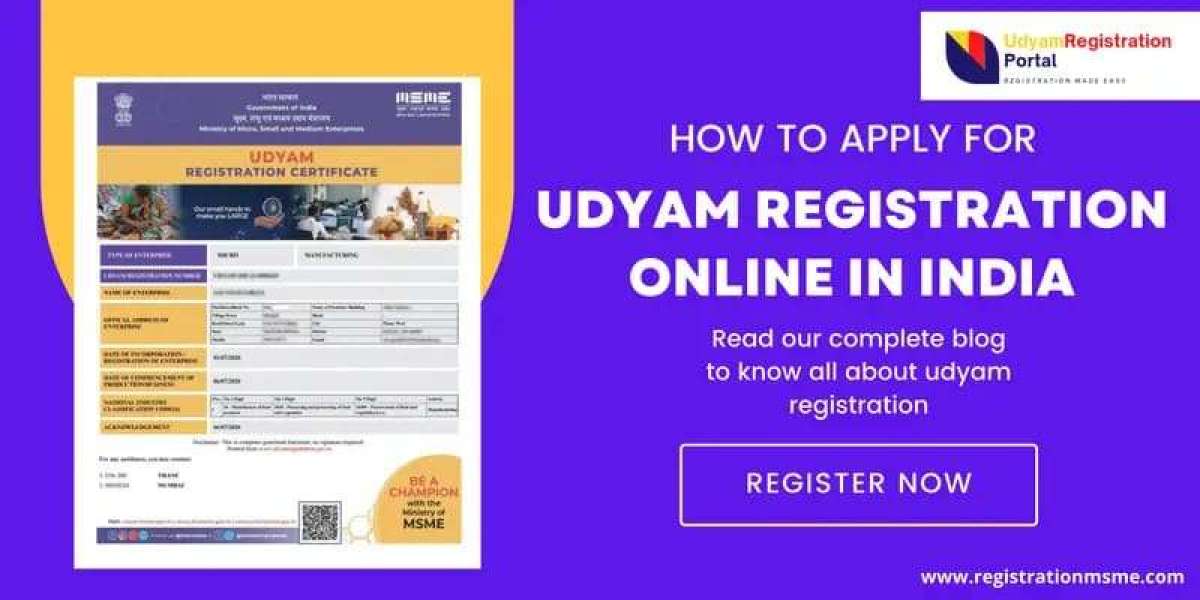Micro, Small, and Medium Enterprises (MSMEs) are the backbone of India’s economy, contributing significantly to employment, GDP, and exports. Recognizing their importance, the Indian government has implemented various financial incentives to support the growth and development of these enterprises. Udyam registration, introduced on July 1, 2020, provides a streamlined process for MSMEs to formalize their operations and access a wide range of financial incentives, including grants, loans, and subsidies. This article explores the key financial incentives available to Udyam-registered businesses and how they contribute to the overall growth of the MSME sector.
Understanding Udyam Registration
Udyam registration is a simplified, online registration process for MSMEs that replaced the earlier Udyog Aadhaar Memorandum (UAM) system. It is designed to provide a formal identity to businesses, making them eligible for various government schemes and financial incentives. The registration process is entirely digital, requiring minimal documentation, and is accessible to businesses across India, including those in remote and rural areas.
Importance of Financial Incentives for MSMEs
Financial incentives play a crucial role in supporting MSMEs by providing them with the necessary capital and resources to grow and expand their operations. These incentives are particularly important for small businesses, which often face challenges in accessing traditional sources of finance due to their size, limited collateral, and higher perceived risk. By offering grants, loans, and subsidies, the government aims to address these challenges and create a conducive environment for MSMEs to thrive.
Key Financial Incentives for Udyam-Registered Businesses
- Grants and Subsidies
Grants and subsidies are non-repayable financial aids provided by the government to support specific activities or initiatives within the MSME sector. Udyam-registered businesses can access a variety of grants and subsidies aimed at promoting innovation, technology adoption, and capacity building.
- Credit Linked Capital Subsidy Scheme (CLCSS): This scheme provides a subsidy of up to 15% on the purchase of plant and machinery for MSMEs. The objective is to encourage the adoption of modern technology and improve productivity. Udyam-registered businesses can avail themselves of this subsidy to upgrade their equipment and remain competitive in the market.
- Technology Upgradation Fund Scheme (TUFS): The TUFS scheme offers financial assistance to MSMEs in the textile and garment sectors for modernizing their production facilities. This includes subsidies on capital investment and interest reimbursement on loans taken for technology upgradation.
- Marketing Assistance Scheme: This scheme provides financial support to MSMEs for participating in trade fairs, exhibitions, and buyer-seller meets, both domestically and internationally. The aim is to enhance the market visibility of MSME products and services.
- National Manufacturing Competitiveness Programme (NMCP): Under this program, Udyam-registered businesses can access various subsidies for initiatives like lean manufacturing, quality certification, and design interventions. The goal is to improve the competitiveness of MSMEs and promote sustainable growth.
- Loans and Credit Schemes
Access to affordable credit is essential for the growth and expansion of MSMEs. The government offers several loan schemes to Udyam-registered businesses, ensuring they have the financial resources needed to invest in their operations, manage cash flow, and take advantage of new opportunities.
- Prime Minister’s Employment Generation Programme (PMEGP): PMEGP is a credit-linked subsidy scheme that provides financial assistance for setting up new enterprises in the non-farm sector. Udyam-registered businesses can access loans with a subsidy component to cover the cost of capital investment, making it easier to start or expand their operations.
- Credit Guarantee Fund Trust for Micro and Small Enterprises (CGTMSE): This scheme provides collateral-free credit to MSMEs, reducing the risk for lenders and making it easier for businesses to obtain loans. Udyam-registered enterprises can avail of loans up to ₹2 crore under this scheme, with the government guaranteeing up to 85% of the loan amount.
- MUDRA Loans: The Micro Units Development and Refinance Agency (MUDRA) provides loans of up to ₹10 lakh to non-corporate, non-farm small/micro enterprises. Udyam-registered businesses can access these loans under three categories—Shishu (up to ₹50,000), Kishor (₹50,001 to ₹5 lakh), and Tarun (₹5,00,001 to ₹10 lakh)—depending on their stage of growth.
- Stand-Up India Scheme: This scheme is designed to promote entrepreneurship among women, SC, and ST communities. It provides bank loans ranging from ₹10 lakh to ₹1 crore for setting up greenfield enterprises in manufacturing, services, or trading sectors. Udyam-registered businesses owned by these groups can access this scheme to obtain the necessary capital for starting new ventures.
- Interest Subsidies and Tax Benefits
To further reduce the cost of finance for MSMEs, the government offers interest subsidies and tax benefits to Udyam-registered businesses. These incentives help lower the overall financial burden on enterprises, allowing them to reinvest savings into growth and expansion.
- Interest Subsidy Scheme for Incremental Credit to MSMEs: This scheme provides a 2% interest subvention on incremental loans extended to MSMEs. Udyam-registered businesses can benefit from reduced interest rates on their borrowings, improving their cash flow and profitability.
- Income Tax Benefits: Udyam-registered businesses may be eligible for various income tax exemptions and deductions under the Income Tax Act. For instance, profits derived from certain activities, such as setting up an industrial undertaking in backward areas, may qualify for tax exemptions. Additionally, deductions are available for expenses related to R&D, employment generation, and infrastructure development.
- Special Schemes for Women Entrepreneurs
Recognizing the need to empower women in the MSME sector, the government offers specific schemes aimed at supporting women entrepreneurs. Udyam registration enables women-owned businesses to access these special schemes, fostering greater gender diversity in entrepreneurship.
- Mahila Udyam Nidhi Scheme: This scheme provides financial assistance to women entrepreneurs for setting up new projects or expanding existing ones. The loans under this scheme are offered at concessional interest rates, making it easier for women to access capital.
- Trade-Related Entrepreneurship Assistance and Development (TREAD): TREAD offers grants to NGOs that provide training and capacity building for women entrepreneurs. Udyam-registered women-owned businesses can benefit from the training programs and financial support available under this scheme.
Conclusion
Udyam registration opens the door for MSMEs to access a wide range of financial incentives, including grants, loans, and subsidies. These incentives play a crucial role in supporting the growth and development of small businesses, particularly those in rural and underserved areas. By formalizing their operations and taking advantage of the financial support available, Udyam-registered businesses can overcome the challenges they face, innovate, and expand their operations. The government’s continued focus on providing targeted financial incentives for MSMEs is essential for driving economic growth, job creation, and inclusive development across India.








